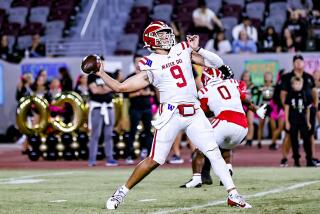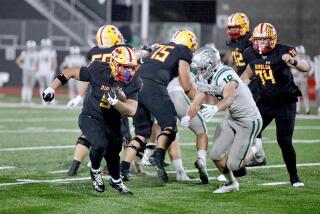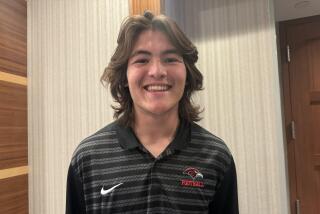Undivided, They Conquered All
- Share via
Three schools won Southern Section football championships despite quarterback controversies that could have divided teammates and created season-long turmoil.
Each case involved more than a simple decision by the coach to choose the best player. There were ethical issues, loyalty questions and lessons about how to treat the player who had come out on the losing end of a complicated quarterback decision.
Westlake Village Westlake was the focus of a yearlong quarterback debate from the moment Rudy Carpenter transferred from rival Newbury Park in February.
Giddy Westlake fans and even some sportswriters were proclaiming Carpenter’s decision as the right one before and after the Warriors’ 28-6 Division IV championship victory over Ventura St. Bonaventure.
On the contrary, his transfer made a mockery of high school sports. Yes, he got his championship ring and he’ll get his college scholarship, but the decision of his parents to move him into an apartment in the school attendance area for the sole purpose of making him eligible was disapproved of by his own Westlake coaches.
It created animosity and tension among Ventura County coaches and caused individuals to question the integrity and motives of everyone involved.
In the end, Carpenter’s transfer worked out only because the losing quarterback in the competition, senior Jason Soporito, decided to be an unselfish, unsung mediator who didn’t gripe, didn’t complain and didn’t choose to light a fuse that could have torn the team apart.
At first, Soporito said he was bitter about Carpenter’s arrival. He had prepared for three years to assume the starting quarterback position at Westlake. But through spring and summer, Carpenter’s humbleness and graciousness won him over.
Soporito said he appreciated Carpenter’s father, Scott, being the first one to offer support after games. Coach Jim Benkert made a genuine gesture in starting Soporito in the opening game of the season.
Soporito also got to play extensively this season in relief of Carpenter, who offered constant support.
“I had an awesome high school experience,” Soporito said. “The camaraderie of our team was special.”
During Westlake’s championship celebration, a game in which Soporito didn’t play, Benkert went up to Soporito, gave him a hug and told him, “I’m glad you stuck it out this season.”
Soporito still thinks he could have guided Westlake to the championship. He has no regrets, other than wondering what could have been.
Asked what he got out of the season besides a championship ring, Soporito said, “I came out with a new friend.”
*
Greg Gano, the coach at Hacienda Heights Los Altos, used a strategy some coaches might label as foolish.
He employed a platoon system at quarterback, playing junior Daniel Sandello, a transfer from West Covina South Hills, in the first half of each game and using senior Jason Estrada in the second half.
Gano said he didn’t have any other choice because the two were of equal ability. No matter the halftime score and no matter which quarterback was doing better in a particular game, the coach stayed with his platoon system all the way to the Division VI championship game.
“There was no other way to do it,” Estrada said. “It would be a waste of talent playing one over the other.”
But in the final game against Orange Lutheran, Sandello had just started to perform well in the first half, and the score was tied, 14-14, at halftime. An unbeaten season was at stake. Would Gano choose to renege on his commitment to both quarterbacks with a championship on the line and play Sandello the entire game?
“Sometimes it’s more than a game,” Gano said.
Gano let Estrada play the entire second half, keeping his commitment. Estrada ended up scoring the go-ahead touchdown with slightly more than five minutes to play in a 21-17 victory.
Afterward, Estrada hugged Gano.
“I was thanking him for having confidence in me,” he said.
*
Kevin Rooney was in his 24th year as coach at Sherman Oaks Notre Dame. His quarterback competition came down to senior Jim Welker and sophomore Garrett Green. He had decided to start Welker in the first two games, then bring in Green off the bench.
By the third game, Rooney concluded he had to pick one, and Green got the nod.
Welker had waited his entire high school career for the chance to play quarterback.
“It was my dream,” he said.
But Rooney decided the team would be better with Green at quarterback and Welker playing receiver, defensive end and on special teams.
Because of the way Rooney handled the delicate decision, Welker accepted it without bitterness.
“It was best for the team,” Welker said. “Coach Rooney is like a mentor. I love him with all my heart. Whatever he says goes. He’s the boss.”
Green went on to lead Notre Dame to the Division III championship, and it was Welker who ran back a blocked field goal for the pivotal touchdown in a 31-7 victory over Palmdale in the final.
Afterward, Welker went up to Rooney and gave him a heartfelt embrace.
“I have never been disappointed in Jim Welker in anything he’s done,” Rooney said. “He wanted very badly to be quarterback. It was hard to tell him. He accepted it and his attitude of unselfishness helped us win a championship.”
Honor, loyalty, commitment. It matters in molding a championship team.
*
Eric Sondheimer can be reached at [email protected].
More to Read
Get our high school sports newsletter
Prep Rally is devoted to the SoCal high school sports experience, bringing you scores, stories and a behind-the-scenes look at what makes prep sports so popular.
You may occasionally receive promotional content from the Los Angeles Times.







